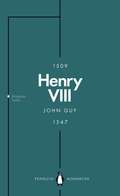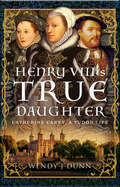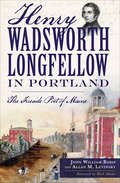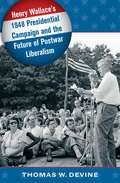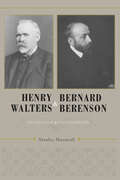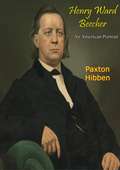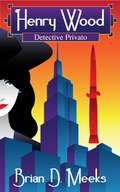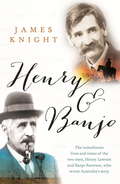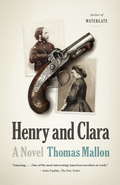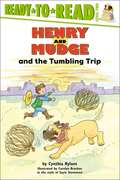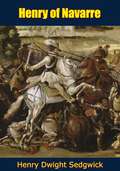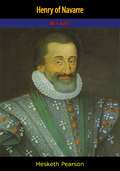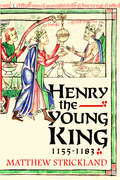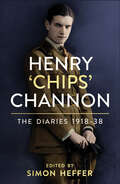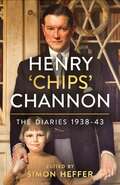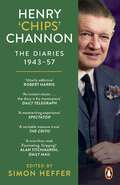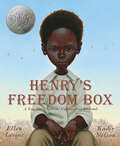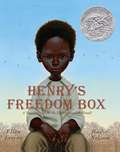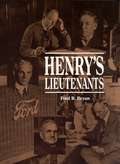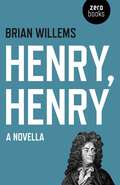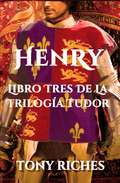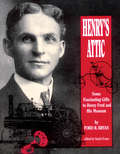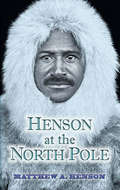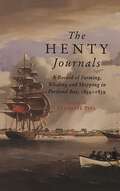- Table View
- List View
Henry VIII: The Quest for Fame (Penguin Monarchs)
by John GuyCharismatic, insatiable and cruel, Henry VIII was, as John Guy shows, a king who became mesmerized by his own legend - and in the process destroyed and remade England. Said to be a 'pillager of the commonwealth', this most instantly recognizable of kings remains a figure of extreme contradictions: magnificent and vengeful; a devout traditionalist who oversaw a cataclysmic rupture with the church in Rome; a talented, towering figure who nevertheless could not bear to meet people's eyes when he talked to them. In this revealing new account, John Guy looks behind the mask into Henry's mind to explore how he understood the world and his place in it - from his isolated upbringing and the blazing glory of his accession, to his desperate quest for fame and an heir and the terrifying paranoia of his last, agonising, 54-inch-waisted years.
Henry VIII’s True Daughter: Catherine Carey, A Tudor Life
by Wendy J. DunnThe lives of Tudor women often offer faint but fascinating footnotes on the pages of history. The life of Catherine – or Katryn as her husband would one day pen her name – Carey, the daughter of Mary Boleyn and, as the weight of evidence suggests, Henry VIII, is one of those footnotes. As the possible daughter of Henry VIII, the niece of Anne Boleyn and the favourite of Elizabeth I, Catherine’s life offers us a unique perspective on the reigns of Henry and his children. In this book, Wendy J. Dunn takes these brief details of Catherine’s life and turns them into a rich account of a woman who deserves her story told. Following the faint trail provided of her life from her earliest years to her death in service to Queen Elizabeth, Dunn examines the evidence of Catherine’s parentage and views her world through the lens of her relationship with the royal family she served. This book presents an important story of a woman who saw and experienced much tragedy and political turmoil during the reigns of Henry VIII, Edward VI, and Mary I – all of which prepared her to take on the vital role of one of Elizabeth I closest and most trusted women. It also prepared her to become the wife of one of Elizabeth's privy councillors – a man also trusted and relied on by the queen. Catherine served Elizabeth during the uncertain and challenging first years of her reign, a time when there was a question mark over whether she would succeed as queen regnant after the failures of England's first crowned regnant, her sister Mary. Through immense research and placing her in the context of her period, HENRY VIII’S TRUE DAUGHTER: CATHERINE CAREY, A TUDOR LIFE draws Catherine out of the shadows of history to take her true place as the daughter of Henry VIII and shows how vital women like Catherine were to Elizabeth and the ultimate victory of her reign.
Henry Wadsworth Longfellow in Portland: The Fireside Poet of Maine
by John William Babin Allan M. LevinskyA look at the beloved American poet&’s home and family, and a glimpse at the early years of Portland, Maine. When a former Revolutionary War general named Peleg Wadsworth finished building a two-story brick house on Congress Street in 1786, the &“province of Maine&” was still considered part of Massachusetts, and he could see the Fore River from his front door. The city would grow up around the structure, as the Wadsworth-Longfellow family flourished and made history within its walls—and in the fabric of young America&’s culture and government. Peleg&’s daughter, Zilpah, married Stephen Longfellow IV on the first floor, and they raised their eight children in the home with love and high standards. Their second-eldest son, Henry Wadsworth Longfellow, wrote his first childhood poem there before going on to pen great classics including &“Paul Revere&’s Ride&” and Evangeline. Young Henry also watched his father help craft the Maine Constitution, and experienced revolutionary ideals of his home city. This book takes you inside the historic Longfellow House—and lets you explore the city that shaped a renowned American poet. Includes photos and illustrations
Henry Wallace's 1948 Presidential Campaign and the Future of Postwar Liberalism
by Thomas W. DevineIn the presidential campaign of 1948, Henry Wallace set out to challenge the conventional wisdom of his time, blaming the United States, instead of the Soviet Union, for the Cold War, denouncing the popular Marshall Plan, and calling for an end to segregation. In addition, he argued that domestic fascism--rather than international communism--posed the primary threat to the nation. He even welcomed Communists into his campaign, admiring their commitment to peace. Focusing on what Wallace himself later considered his campaign's most important aspect, the troubled relationship between non-Communist progressives like himself and members of the American Communist Party, Thomas W. Devine demonstrates that such an alliance was not only untenable but, from the perspective of the American Communists, undesirable. Rather than romanticizing the political culture of the Popular Front, Devine provides a detailed account of the Communists' self-destructive behavior throughout the campaign and chronicles the frustrating challenges that non-Communist progressives faced in trying to sustain a movement that critiqued American Cold War policies and championed civil rights for African Americans without becoming a sounding board for pro-Soviet propaganda.
Henry Walters and Bernard Berenson: Collector and Connoisseur
by Stanley MazaroffCollecting Italian Renaissance paintings during America’s Gilded Age was fraught with risk because of the uncertain identities of the artists and the conflicting interests of the dealers. Stanley Mazaroff’s fascinating account of the close relationship between Henry Walters, founder of the legendary Walters Art Museum in Baltimore, and Bernard Berenson, the era’s preeminent connoisseur of Italian paintings, richly illustrates this important chapter of America’s cultural history. When Walters opened his Italianate museum in 1909, it was labeled as America’s "Great Temple of Art." With more than 500 Italian paintings, including self-portraits purportedly by Raphael and Michelangelo, Walters’s collection was compared favorably with the great collections in London, Paris, and Berlin. In the midst of this fanfare, Berenson contacted Walters and offered to analyze his collection, sell him additional paintings, and write a scholarly catalogue that would trumpet the collection on both sides of the Atlantic. What Berenson offered was what Walters desperately needed—a badge of scholarship that Berenson’s invaluable imprimatur would undoubtedly bring. By 1912, Walters had become Berenson’s most active client, their business alliance wrapped in a warm and personal friendship. But this relationship soon became strained and was finally severed by a confluence of broken promises, inattention, deceit, and ethical conflict. To Walters’s chagrin, Berenson swept away the self-portraits allegedly by Raphael and Michelangelo and publicly scorned paintings that he was supposed to praise. Though painful to Walters, Berenson’s guidance ultimately led to a panoramic collection that beautifully told the great history of Italian Renaissance painting. Based primarily on correspondence and other archival documents recently discovered at the Walters Art Museum and the Villa I Tatti in Florence, the intriguing story of Walters and Berenson offers unusual insight into the pleasures and perils of collecting Italian Renaissance paintings, the ethics in the marketplace, and the founding of American art museums.
Henry Ward Beecher: An American Portrait (American Newspapermen 1790-1933 Ser.)
by Paxton HibbenFirst published in 1927, this is the acclaimed biography of Henry Ward Beecher (1813-1887), the American Congregationalist clergyman, social reformer and speaker best known for his support of the abolition of slavery. It was written by former American diplomat, journalist, author and humanitarian Paxton Hibben (1880-1928).“Mr. Hibben has written a great biography, and one of lasting value. It is not merely interesting; it is profound. But its historical scholarship does not lie like a leaden weight on the book; for Hibben’s style is graceful and delicate, sometimes almost gay. He is so saturated with Beecher knowledge that he writes without effort. In reading it one feels that Paxton Hibben understands Beecher better than anybody has ever understood him, and that this book is a permanent contribution to American history.”—W. E. Woodward
Henry Wood – Detective Privato
by Marina Albamonte Brian D. Meeks1° gennaio 1955. Henry Wood è uscito malconcio dai bagordi della notte di capodanno del 1954. Nel suo mondo le cose finora sono state bianche o nere, giuste o sbagliate, ma la sua vita sta per cambiare e d’ora in poi ci saranno sempre sfumature di grigio. Tutto sommato non è niente male come detective. Tifoso sfegatato dei Brooklyn Dodgers, Henry sta per essere ingaggiato da una bella ragazza affinché le ritrovi il padre e il libro contabile di cui questi si stava occupando. Il caso appare alquanto semplice, ma quando un seconda donna richiede i suoi servizi per ritrovare lo stesso libro contabile, Henry comincia sospettare che dietro alla sparizione dell’uomo ci sia qualcosa di grosso, di molto più grande di lui. E ha ragione. Ritrovare l’uomo e il suo libro contabile diventerà ben presto l’ultimo dei suoi problemi perché anche il capo della mafia locale, Tommy “il Coltello” mira a quel libro contabile e, finché non riuscirà a entrarne in possesso, il boss sa di essere vulnerabile, facile preda degli altri capi famiglia. Ma di chi si può fidare Henry? C’è un misterioso quanto sconosciuto benefattore che sembra avere a cuore solo il suo bene. Henry accetterà l’aiuto che gli verrà offerto? Ma soprattutto, ha altra scelta?
Henry and Banjo: The Tumultuous Lives And Times Of Henry Lawson And Banjo Paterson, The Men Who Wrote Australia's History
by James KnightThe fascinating lives and turbulent times of Henry Lawson and Andrew 'Banjo' Paterson - the two men who wrote Australia's story.Today most of us know that Henry Lawson and Andrew 'Banjo' Paterson were famous writers. We know about Matilda, Clancy of the Overflow and the Man from Snowy River; The Drover's Wife, While the Billy Boils and Joe Wilson and his mates, but little else. Here, in a compelling and engaging work, James Knight brings Henry and Banjo's own stories to life. And there is much to tell.Both were country born, just three years and three hundred kilometres apart, Henry on the goldfields of Grenfell and Banjo on a property near Orange, but their paths to literary immortality took very different routes - indeed at times their lives were ones of savage and all too tragic contrasts. Banjo, born into a life of comparative privilege, would rise from country boy to Sydney Grammar student, solicitor, journalist, war correspondent and revered man about town. Henry's formal education only began when his feminist mother finally won her battle for a local school but illness and subsequent deafness would make continuing his lessons difficult, seeing him find work as a labourer, a coach painter and a journalist, all the while wrestling with poverty, alcoholism and mental illness. Both men would become household names during their lifetimes. Both would have regrets.Henry and Banjo details two incredibly fascinating lives and delves into the famous (and not so famous) writings of the two men who had the power to influence and change Australia.
Henry and Clara: A Novel
by Thomas MallonHenry and Clara Rathbone were a young couple who sat in the President's box the night of Abraham Lincoln's assassination. Born of socially prominent families and raised as stepbrother and stepsister, the pair began a passionate love affair that thrived despite the wishes of their parents and society. But their witnessing of the event that shook the nation changed their lives forever, leading to guilt, madness, and eventually murder. Relying on historical evidence, Thomas Mallon brings to life one of the most fascinating, though little-known tales from our nation's history, in this astonishing and moving story that is a successful blend of fact and fiction.
Henry and Mudge and the Tumbling Trip (Henry and Mudge Ser.)
by Cynthia RylantWhen Henry's mom and dad start looking through a book about the Wild West it means VACATION TIME FOR HENRY AND MUDGE. A journey awaits, full of cowboy hats and boots, cactus plants and canyons, and all the tumbleweeds that Mudge can chase... Will Mudge ever want to come home? Join the car trip as Henry discovers that sometimes the best adventures in the wide world are the ones on your own front porch. Since its creation in 1987, the Henry and Mudge series has grown into one of the most beloved and acclaimed beginning-reading series ever. With more than two million copies sold, the American Library Association, the Library of Congress, Parents' Choice, The Horn Book Magazine, the International Reading Association, the American Bookseller Association, and most importantly, the thousands of children who belong to the Henry and Mudge fan club have recommended these wonderful books. Created by renowned Newbery Medalist Cynthia Rylant and acclaimed illustrator Sucie Stevenson, the Henry and Mudge series is without a doubt a classic for all time. Ready-to-Read books offer children a world of possibilities at four different reading levels: Pre-level 1: Recognizing Words Word repetition Familiar words and phrases Simple sentences Level 1: Starting to Read Simple stories Increased vocabulary Longer sentences Level 2: Reading Independently More-complex stories Varied sentence structure Paragraphs and short chapters Level 3: Reading Proficiently Rich vocabulary More-challenging stories Longer chapters
Henry and the Climbing Boys (Fountas & Pinnell Classroom, Guided Reading)
by Chris Coady Casie HermanssonNIMAC-sourced textbook. Risky Work. Sweeping chimneys is dangerous work, but Henry knows how to get the job done, until he's stuck working with the youngest boy on the crew.
Henry of Navarre
by Henry Dwight SedgwickOriginally published in 1930, this is a fascinating historical biography of Henry III, who was the King of Navarre from 1572 to 1610, having inherited the throne of Navarre on the death of his mother Jeanne III on June 9, 1572. This book was written by renowned historian Henry Dwight Sedgwick.Henry III (13 December 1553 - 14 May 1610), who later became Henry IV, was the first French monarch of the House of Bourbon, a branch of the Capetian dynasty. As a Huguenot, Henry was involved in the French Wars of Religion, barely escaping assassination in the St. Bartholomew’s Day massacre, and later led Protestant forces against the royal army. As Head of the House of Bourbon, Henry was a direct male-line descendant of Louis IX of France, and “first prince of the blood”.
Henry of Navarre: His Life
by Hesketh PearsonQuite the most picturesque personality in the long line of French monarchy, Henry IV combined physical bravery with mental enlightenment to a degree unmatched among rulers of mankind. He envisaged and worked for the union of the Christian religions and the brotherhood of the European nations, for the concord of sects and the amity of states.Three and a half centuries ago his ideals were considered chimerical: now the’ are regarded as the only hope for the survival of civilisation.Apart from his amazing achievements as a soldier and a ruler, winning all his big battles, raising France from destitution to affluence, and creating a nation out of feudal dukedoms hostile to the Crown, he was wonderfully good-hearted, tolerant, sagacious, witty and democratic. Like his grandson, Charles II of England, he was immoderately amorous, and his love-affairs brought out all the weaknesses of a generous, easy-going nature.At the age of twelve Hesketh Pearson was attracted to Henry of Navarre in the romances of Dumas and Stanley Weyman, and since then has read innumerable books on the subject. In this work the biographer has extricated the man from the fictional and historical legends that have blurred his real nature, and has clearly displayed his strength, his frailty and his abounding humanity.
Henry the Young King, 1155-1183
by Matthew StricklandThis first modern study of Henry the Young King, eldest son of Henry II but the least known Plantagenet monarch, explores the brief but eventful life of the only English ruler after the Norman Conquest to be created co-ruler in his father's lifetime. Crowned at fifteen to secure an undisputed succession, Henry played a central role in the politics of Henry II's great empire and was hailed as the embodiment of chivalry. Yet, consistently denied direct rule, the Young King was provoked first into heading a major rebellion against his father, then to waging a bitter war against his brother Richard for control of Aquitaine, dying before reaching the age of thirty having never assumed actual power. In this remarkable history, Matthew Strickland provides a richly colored portrait of an all-but-forgotten royal figure tutored by Thomas Becket, trained in arms by the great knight William Marshal, and incited to rebellion by his mother Eleanor of Aquitaine, while using his career to explore the nature of kingship, succession, dynastic politics, and rebellion in twelfth-century England and France.
Henry ‘Chips’ Channon (Volume 1): 1918-38
by Chips ChannonThe Sunday Times bestselling edition of Chips Channon's remarkable diaries.Born in Chicago in 1897, 'Chips' Channon settled in England after the Great War, married into the immensely wealthy Guinness family, and served as Conservative MP for Southend-on-Sea from 1935 until his death in 1958. His career was unremarkable. His diaries are quite the opposite. Elegant, gossipy and bitchy by turns, they are the unfettered observations of a man who went everywhere and who knew everybody. Whether describing the antics of London society in the interwar years, or the growing scandal surrounding his close friends Edward VIII and Wallis Simpson during the abdication crisis, or the mood in the House of Commons in the lead up to the Munich crisis, his sense of drama and his eye for the telling detail are unmatched. These are diaries that bring a whole epoch vividly to life. A heavily abridged and censored edition of the diaries was published in 1967. Only now, sixty years after Chips's death, can an extensive text be shared.________________________________'Chips perfectly embodied the qualities vital to the task: a capacious ear for gossip, a neat turn of phrase, a waspish desire to tell all, and easy access to the highest social circles across Europe.[...] Blending Woosterish antics with a Lady Bracknellesque capacity for acid comment. Replete with fascinating insights.' Jesse Norman, Financial Times
Henry ‘Chips’ Channon (Volume 2): 1938-43
by Chips ChannonThe second volume of the remarkable, Sunday Times bestselling diaries of Chips Channon.'A masterpiece - a time machine that transports the reader back to British politics and high society at the end of the 1930s.' Robert Harris'The uncensored, unvarnished thought of one of the 20th century's greatest diarists. - Best Biographies of the Year, Telegraph'An unrivalled guide to the social and political life of Britain in the first half of the 20th century.' Books of the Year, The Times'Fascinating.' New Statesman'Never a dull day, never a dull sentence.' Daily Mail_______________________________________________This second volume of the bestselling diaries of Henry 'Chips' Channon takes us from the heady aftermath of the Munich agreement, when the Prime Minister so admired by Chips was credited with having averted a general European conflagration, through the rapid unravelling of appeasement, and on to the tribulations of the early years of the Second World War. It closes with a moment of hope, as Channon, in recording the fall of Mussolini in July 1943, reflects: 'The war must be more than half over.'For much of this period, Channon is genuinely an eye-witness to unfolding events. He reassures Neville Chamberlain as he fights for his political life in May 1940. He chats to Winston Churchill while the two men inspect the bombed-out chamber of the House of Commons a few months later. From his desk at the Foreign Office he charts the progress of the war. But with the departure of his boss 'Rab' Butler to the Ministry of Education, and Channon's subsequent exclusion from the corridors of power, his life changes - and with it the preoccupations and tone of the diaries. The conduct of the war remains a constant theme, but more personal preoccupations come increasingly to the fore. As he throws himself back into the pleasures of society, he records his encounters with the likes of Noël Coward, Prince Philip, General de Gaulle and Oscar Wilde's erstwhile lover Lord Alfred Douglas. He describes dinners with members of European royal dynasties, and recounts gossip and scandal about the great, the good and the less good. And he charts the implosion of his marriage and his burgeoning, passionate friendship with a young officer on Wavell's staff.These are diaries that bring a whole epoch vividly to life.
Henry ‘Chips’ Channon: The Diaries (Volume 3): 1943-57
by Chips ChannonThe third and final volume of the remarkable Sunday Times bestselling diaries of Sir Henry 'Chips' Channon___________________________________________'An utterly addictive glimpse of London high society and politics in the 40s and 50s.' Robert Harris'An instant classic . . . quite simply the greatest social and political diaries of the 20th century.' Daily Telegraph'Rich, exuberant, copious and shatteringly honest.' Spectator'A scurrilous read. Fascinating. Gripping!' Alan Titchmarsh'Chips writes with such vividness that one feels one is living each day in his exalted company.' The Oldie_______________________________________This final volume of the unexpurgated diaries of Sir Henry 'Chips' Channon begins as the Second World War is turning in the Allies' favour. It ends with Chips descending into poor health but still able to turn a pointed phrase about the political events that swirl around him and the great and the good with whom he mingles.Throughout these final fourteen years Chips assiduously describes events in and around Westminster, gossiping about individual MPs' ambitions and indiscretions, but also rising powerfully to the occasion to capture the mood of the House on VE Day or the ceremony of George VI's funeral. His energies, though, are increasingly absorbed by a private life that at times reaches Byzantine levels of complexity. We encounter the London of the theatre and the cinema, peopled by such figures as John Gielgud, Laurence Olivier, Vivien Leigh and Douglas Fairbanks Jr, as well as a seemingly endless grand parties at which Chips might well rub shoulders with Cecil Beaton, the Mountbattens, or any number of dethroned European monarchs.He has been described as 'The greatest British diarist of the 20th century'. This final volume fully justifies that accolade.
Henry's Freedom Box
by Ellen LevineA stirring, dramatic story of a slave who mails himself to freedom by a Jane Addams Peace Award-winning author and a Coretta Scott King Award-winning artist.Henry Brown doesn't know how old he is. Nobody keeps records of slaves' birthdays. All the time he dreams about freedom, but that dream seems farther away than ever when he is torn from his family and put to work in a warehouse. Henry grows up and marries, but he is again devastated when his family is sold at the slave market. Then one day, as he lifts a crate at the warehouse, he knows exactly what he must do: He will mail himself to the North. After an arduous journey in the crate, Henry finally has a birthday -- his first day of freedom.
Henry's Freedom Box: A True Story From The Underground Railroad
by Ellen Levine Kadir NelsonA stirring, dramatic story of a slave who mails himself to freedom by a Jane Addams Peace Award-winning author and a Coretta Scott King Award-winning artist. <P> Henry Brown doesn't know how old he is. Nobody keeps records of slaves' birthdays. All the time he dreams about freedom, but that dream seems farther away than ever when he is torn from his family and put to work in a warehouse. Henry grows up and marries, but he is again devastated when his family is sold at the slave market. Then one day, as he lifts a crate at the warehouse, he knows exactly what he must do: He will mail himself to the North. After an arduous journey in the crate, Henry finally has a birthday -- his first day of freedom.<P> Winner of the Caldecott Honor
Henry's Lieutenants
by Ford R. BryanAlthough Henry Ford gloried in the limelight of highly publicized achievement, he privately admitted, "I don't do so much, I just go around lighting fires under other people." Henry's Lieutenants features biographies of thirty-five "other people" who served Henry Ford in a variety of capacities, and nearly all of whom contributed to his fame. These biographical sketches and career highlights reflect the people of high caliber employed by Henry Ford to accomplish his goals: Harry Bennett, Albert Kahn, Ernest Kanzler, William S. Knudsen, and Charles E. Sorenson, among others. Most were employed by the Ford Motor Company, although a few of them were Ford's personal employees satisfying concurrent needs of a more private nature, including his farming, educational, and sociological ventures. Ford Bryan obtained a considerable amount of the material in this book from the oral reminiscences of the subjects themselves.
Henry, Henry: A Novella
by Brian WillemsHenry, Henry is a brilliantly conceived experimental novel comprising two alternating stories: a factually inaccurate pseudo-biography of 17th-century composer Henry Purcell and the mid-20th-century story of the people writing the biography. In the 17th-century narrative, the young Henry is repeatedly imprisoned, has an affair with the choirmaster's wife, and is afflicted with an unusual fondness for nice clothes. Falsely accused of stealing all of the cornets from the royal stock of instruments, Henry is banished to a town infested with the plague. There he starts an affair with another woman, Cathleen. Upon his return to London, Henry is confronted with the complexities of his love life. The 20th-century narrative tells of faux-scholar Mr Austen who has taken up residence in a small coastal town to get on with his work. There he befriends the Purcell family: mother and young son Henry. At once wild, philosophical and thought-provoking, Henry, Henry is a novella that will stay with you.
Henry: Libro Tres de la Trilogía Tudor (DA TRILOGIA TUDOR #3)
by Tony RichesBosworth 1485. Tras su victoria sobre el rey Richard III, Henry Tudor se convierte en rey de Inglaterra. Rebeldes e impostores conspiran para quitarle el trono. Los barones se oponen a los planes de Henry tendientes a disminuir su poder, y él no está seguro de en quién puede confiar. Su deseo es unir las casa de Lancaster y de York a través de su matrimonio con la bella Elizabeth de York. Con la ayuda de su madre, lady Margaret Beaufort, consigue mantener una paz frágil. Escoge una princesa española, Catalina de Aragón, como esposa para su hijo, el príncipe Arthur. Sus hijas se casarán con el rey de Escocia y con el hijo del emperador de Roma. Cuando parece que sus plegarias han sido escuchadas, la tragedia lo golpea y Henry deberá asegurar el futuro de los Tudor.
Henry’s Attic: Some Fascinating Gifts to Henry Ford and His Museum
by Ford R. BryanHenry's Attic provides fascinating documentation of some of the one million artifacts in the Henry Ford Museum and Greenfield Village.
Henson at the North Pole
by Matthew A. HensonIn 1909, after two decades of strenuous efforts, the Peary Arctic Club expedition team triumphantly arrived at the North Pole. Commander Peary and his African-American companion, Matthew Henson, had endured several failed attempts to cross hundreds of miles of frozen ocean. But with their growing skill and experience, along with the assistance of Inuit guides, the explorers successfully planted the U.S. flag at the top of the world. This is Matthew Henson's firsthand account of the epic adventure--a dramatic tale of danger, courage, and determination.Hailed by The New York Times as a "really valuable addition" to the literature of polar exploration, and by Commonweal as "fascinating and exciting," Henson's story begins with his early years as a sailor. His navigational expertise proved invaluable to the Peary expeditions, and although racism kept him from receiving his rightful recognition a century ago, there is no doubt that his heroism ensured the enterprise's success. Henson not only mastered the Inuit language, but he built and drove the sleds and broke the trails. He hunted game to keep the starving explorers alive, carrying crew members when they were too weak to walk. His compelling narrative recaptures all the glory of the golden age of exploration. This edition features a Foreword by Robert E. Peary and an Introduction by Booker T. Washington, in addition to six historic photographs.
Henty Journals: A Record of Farming, Whaling and Shipping in Portland Bay, 1834–1839
by Lynnette PeelThe Henty family emigrated from Sussex to Launceston in Van Diemen's Land in the early 1830s. Three of the brothers became pioneer settlers at Portland Bay on Australia's southern coast. Their journals, which are among the most valuable items in the manuscript collection of the LaTrobe Library, State Library of Victoria, have never before been published. Written by Edward and Francis, with some entries by John, this daily working record tells of five years in the lives of four young men variously engaged in farming, whaling and coastal shipping. These meticulous journals are enlivened by a fascinating range of contemporary illustrations. The book is an invaluable record both of the introduction of well-ordered English farming methods to a new land and of the populations of right whales that once visited Portland Bay—interspersed with events such as the arrival of Major Mitchell, Surveyor-General of New South Wales, who 'was not a little surprised to find Englishmen in this Part of the World'.
